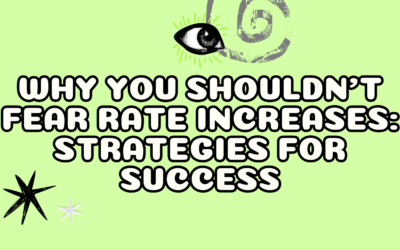“Can you send me some results you’ve achieved with past email campaigns?”
This email landed in my inbox with a metaphorical thud.
The old me (like, two-years-ago-me) would have come down with a serious case of the cold sweats as a mega-dose of imposter syndrome set in: how could I possibly prove myself?
I was a writer.
I just wrote the emails and then clients did with them what they wanted. When I’d handed over my words, they were at the mercy of whoever was at the end of the email. It wasn’t my responsibility to find out the results.
Or was it??
Well, if I hadn’t got my act together and pestered (in a good way, of course) my clients to hand over the good stuff like numbers and figures, I wouldn’t have landed this gig.
“Sure,” my cool response started. “I’ve put together a case study for you that shows how one of my email campaigns sold out a client’s programme in ten minutes.”
I don’t think the client even waited half an hour to respond.
“We’d love to have you on board!”
And that was the beginning of a one-and-a-half-day project that paid £1,000.
These testimonials and case studies that show how you helped clients get from A to B are an underrated part of freelancing. Yes, it’s easy enough to get a “so-and-so was a gem to work with!” review from a client, but what about the information that really matters? What about cold hard facts that show how you changed their business and maybe even their lives?
This is what we in the business (or anyone anywhere really) call social proof.

What the Heck is Social Proof?
Social proof is all about influence.
When you fancy a trip to the cinema (mainly because you’re craving an oversized, overpriced box of popcorn – salty and sweet, please) are you more likely to listen to big billboards that have been dreamt up by advertising departments or a recommendation from a friend?
If it’s the latter, you’re not alone.
In fact, companies often spend a whacking great fortune on highly polished ads when all they really need are a set of amazing reviews from previous customers.
For freelancers, social proof can be boiled down into two main areas:
- Testimonials
- Case studies
Testimonials are reviews of your relationship with clients straight from the horse’s mouth. The best kind of testimonials share how you and your talented skillset helped someone get from A to B, often passing a huge sticking point on the way.

Case studies, on the other hand, go into a little more detail.
They outline the stages of the working process that you went through with a client and cover why the client needed your help, how you helped, and what the results were.
Why Social Proof is the Most Powerful Form of Marketing Yourself as a Freelancer
These days, it’s fairly common (though it makes me a little sick in my mouth) to hear about freelancers earning pennies for a project. A lot of people go into the industry believing that they need to charge as little as possible to be viable competition against other freelancers who are also charging pennies.
It’s a vicious circle.
But then you’ll come across a freelancer that charges £200 an hour or £1,000 a day and you can’t help but question how they got to that holy grail point: were they lucky enough to be in the right place at the right time? Does their family have royal connections in high-up places? Did they get a degree from a top university? Are they just better at everything?!
While these all may be factors in why and how some freelancers charge more than others, there’s one thing that all self-employed people are capable of doing and that’s getting social proof.
So, first-things-first:
Every freelancer can get social proof
You don’t need to know the ins and outs of the latest technology. You don’t need to sell your firstborn. You just need to get a couple of sentences from past clients who can vouch for you and your skills (and, if you haven’t had any clients yet because you’re just starting out, stay tuned as I’ve got a few tricks up my sleeve for you).
But why is social proof so important?
The answer is trust.
Social proof is the biggest trust builder

In this day and age, when everyone seems to be hidden away behind the anonymity of a screen, it’s really difficult to build any sense of trust.
A lot of freelancers never meet their clients and prospects are simply a name and an email address attached to a server, so being able to quickly build trust instantly puts you ahead of the glut of faceless freelancers out there.
This is why sites like TripAdvisor are so huge.

People want to hear what their peers think about a service, and if you’re target prospect is CEOs in finance companies, they’re going to want to see what other CEOs in finance companies think about working with you.
Take a look at these fun stats:
- Almost 70% of online consumers look at reviews before making a purchase
- Reviews are 12x more trusted than descriptions and sales copy
What does this mean for you as a freelancer?
It means that your landing page or service descriptions might be the shiniest, most lovely thing in the world, but if you add in a simple review the “Trust Factor” will dramatically increase. It could be the difference between nabbing that awesome new client or losing them to a freelancer who did display reviews.
Clients need to justify their spending
What it really boils down to is the fact that no one wants to pay for something that won’t get them the results they need.
Let’s face it…
Every prospect reaches out to a freelancer in the hopes that they’ll be able to help solve a problem. And, with so many freelancers out there, it’s easy enough to move onto the next when you can’t find any hard, solid evidence that they can do what they say they do.
Would you hire a plumber to come and fix your toilet if you had absolutely zero, diddly-squat proof that they had actually successfully fixed toilets in the past?
I think not. Or, at least, I’d hope not. You’re not that naive, right? 😉
3 Quick (and Clean) Ways to Get Testimonials that Tirelessly Work For You
Maybe you’re sitting there, looking at your painfully testimonial-free website and are racking your brains for any sliver of nice comments past clients bestowed upon you.
But if you’re feeling the pressure without any social proof, there are three quick ways you can get some right now.
1. Go back to old clients and simply ASK
The saying goes, “if you don’t ask, you don’t get” and this is painfully true of testimonials. Most clients won’t automatically reel off the amazing things you did for their business unless you outright ask them.
Think about it: even the biggest review sites like TripAdvisor, Yelp, and Facebook prompt users for reviews. They don’t expect people to willingly go out of their way to write glowing testimonials.
Now, the thought of reaching out might be scary, but from experience I know that clients are more than happy to share their experience of working with you if it was a good one.
Your task now is to reach out to one or two past clients and say something like:
“Hey CLIENT, I hope you’re doing well! I’m currently refreshing my website and would love to add a testimonial from you to it. I really enjoyed working on PROJECT together and I’d really appreciate it if you could send across a couple of sentences about how you found working with me. Thanks!”
It’s simple. It’s straight-to-the-point. It’ll do the job.
You just need one or two testimonials or reviews on your website to begin with; just enough so that potential prospects can get an insight into how you’ve worked with other clients and what kind of results you might get for them.
2. Pro bono work for proof
There’s a time and a place for pro bono work (working for free), and I think this is absolutely one of them.
If you’re just starting out and haven’t had even a ghost of a client, you might be sitting there biting your nails wondering how the heck you’re going to prove that you can do what you say you can.
Never fear! Working for free is here!
Reach out to a local business or a company in your niche and offer to do a SMALL amount of freelance work for them in exchange for a testimonial (the emphasis here is on a SMALL amount of work. You don’t want to get tied into a mega-project with no sign of payment in sight).
3. Write up a couple of case studies
Case studies show your working process and how you helped a client get from A to B. You don’t necessarily need a testimonial or input from your clients here (though that might help). Instead, it’s just a case of positioning the project in three stages:
- The challenge (a.k.a. Why the client came to you for help)
- What your solution was
- How it turned out (what you created for them and, if you can, a couple of words from the client about how it solved their problem)
Case studies pack an extra punch because they show your working process alongside what kind of problems you can solve.

Think about it: if a prospect lands on your site, clicks through to read a case study that shows how you solved a similar problem they have, they’re WAY more likely to reach out and enquire about your services because they want in on that action.
The Proof is in the Pudding
There’s a myth about freelancing.
This myth implies that you’re a service provider when really that’s not what clients pay for.
Instead, they pay for a solution to a problem that’s holding them back – whether it’s compelling copy for their product descriptions to get more customers or a user-friendly website to attract more sign-ups.
And people will pay good money for a solution to something that’s been bothering them.
This is why it’s important to show potential prospects that you can do what you say you can. It’s basically you saying, “hey, here you go, here’s how I’ve solved problems people just like you have had”.
The power of peer reviews is incredible and it’s something that’s been dubbed the Bandwagon Effect.

When we read a lot of reviews about how amazing a product or solution is, we want to be a part of it; it’s human nature. So when potential prospects see a glut of testimonials from people just like them that you’ve helped in the past, they’re going to want to get on that bandwagon.
The Different Kinds of Social Proof
But social proof for freelancers isn’t just limited to testimonials and case studies. As business owners, there are a number of other ways we can “prove” ourselves:
- Certifications – have you taken any courses or received any certificates that make you qualified to do what you do?
- Client logos – have you worked with notable clients in your niche and can you display their logos on your website as evidence?

- Video testimonials – videos carry more “oomph” than written testimonials because prospects can see the client as a real person, making it easier to relate to them
- Media mentions – have you appeared in any media? Maybe the local newspaper interviewed you, or you got a special mention in a big online publication? Put this on your website!
Why Social Proof Means You Can Charge More
Like I said earlier, people pay for results, not a service.
They pay for a beautiful website that attracts customers better than their competitor site does. They pay for detailed white papers that help them land high-quality clients themselves. They pay for a user-friendly app that is so addictive it’ll shoot straight to the top of the App Store.
Clients don’t pay for a “website”, they pay for “better than their competitor.”
They don’t pay for a white paper, they pay for a tool to land them high-quality clients.
You get the picture.
Social proof hits on the need for results. Instead of simply being a “writer”, you’re someone who uses writing to get results for clients. Instead of simply being a designer, you’re someone who uses design to keep visitors coming back for more.
THIS is what clients pay for and it’s what your testimonials and case studies prove.
Think about it like this: who is likely to charge more out of a freelancer who has two glowing testimonials on their site that show how they helped double their client’s page views, and a freelancer who simply says they will double page views?
Everyone wants proof.
Remember, trust is key and social proof is one of the easiest and most powerful ways you can “prove” yourself in today’s distrustful online dystopia.
I challenge you to give it a go today.
Reach out to past clients, write up a case study, or carry out a short pro bono project in exchange for a testimonial and put it loud and proud on your website. Then come back here and tell me how you get on…
Want more clients?

Find Freelance Clients Fast is a FREE 7-day mini-course that will show you:
- The four elements of a profitable freelance business
- How to grab the attention of prospects
- Where to find high-paying clients
- The number one way to land clients quickly
You in?!






Thank you for answering one of the toughest newbie questions! “Social Proof” sounds intimidating, but this step-by-step simplifies and makes it “do-able” for anyone.
Glad this was useful for you, Rhonda!
What if you haven’t got anyone you can ask for info for a case study? It’s difficult to measure the impact of blog posts – true, you can see if traffic increases when you start writing them, but there’s not always an obvious ROI on them. As I mostly write blog posts, what kind of case study might I do?
True – it’s more difficult to measure the impact of blog posts than, say, landing pages etc, but it’s still possible. I ask my clients to send across the increase in pageviews they’ve had since I started blogging for them as well as any increase in subscribers that can be tracked back to blog posts (if they have marketing teams, they should be able to dig out this information pretty easily).
Otherwise, I’ve had clients tell me they’ve appeared on awards lists and “best in industry” lists that were prompted by their improved visibility in the industry and their authoritative content. Hope this helps!
Thank you for the video. It has been a tonic!